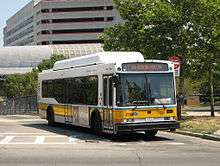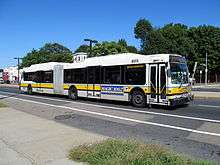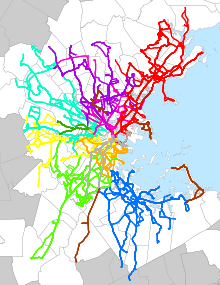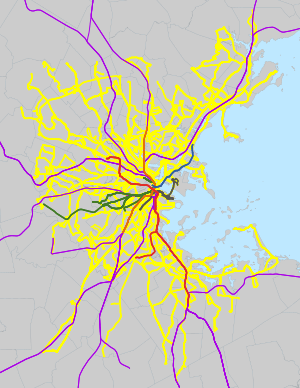MBTA Bus
|
A New Flyer XDE40 bus at Sullivan station on Route 95 | |||
| Parent | Massachusetts Bay Transportation Authority | ||
|---|---|---|---|
| Founded | 1964 (predecessors date to 1856) | ||
| Locale | Greater Boston | ||
| Service area | Boston and immediate suburbs | ||
| Service type | Local, limited stop, express, and Silver Line BRT | ||
| Routes | 177[1] | ||
| Fleet | 998[1] | ||
| Daily ridership | 387,815 (2013)[2] | ||
| Fuel type | Diesel, CNG, Electric-Trolleybus, Diesel-Electric Hybrid | ||
| Operator | MBTA; private operators | ||
| Website | mbta.com | ||
| |||
The Massachusetts Bay Transportation Authority operates 177 bus routes (list of routes) in the Greater Boston area, many of which were formerly part of a large streetcar system. Some routes are for local transport within the city; others bring passengers from surrounding areas to stops on the MBTA Commuter Rail or subway lines. The MBTA has a policy objective to provide transit service within walking distance (defined as 0.25 miles (0.40 km)) for all residents living in areas with population densities greater than 5,000 inhabitants per square mile (1,900/km2) within the MBTA's service district. Much of this service is provided by bus.
The MBTA operates a four-route bus rapid transit service branded as the Silver Line, as well as three crosstown routes that were intended to become the first part of the now-suspended Urban Ring project. Fifteen routes designed as key routes run with higher frequency at all times, including extended service hours on Friday and Saturday nights over some of these routes.
Most MBTA Bus service is served by diesel, compressed natural gas, and diesel-electric hybrid buses. Silver Line routes running in the Waterfront Tunnel use dual-mode buses that operate as trolleybuses in the tunnel and as diesel-electric hybrid buses on the surface. Four routes based out of the Harvard Bus Tunnel run with trolleybuses in Cambridge, Massachusetts and also serve several surrounding suburbs.
All buses and routes are wheelchair-accessible (see MBTA accessibility); most of the MBTA's bus fleet consists of low-floor buses with wheelchair ramps, while older high-floor buses have lifts. All buses have amber (orange) colored LED exterior headsigns displaying route and destination, with automated audio/visual stop announcements for passengers.
Fleet
Active fleet
This is the current bus roster for the MBTA as of October 27, 2016, including two groups of buses where delivery is ongoing. All buses are 102 inches (260 cm) wide; most are standard-length 40-foot (12 m) length while some are 60-foot (18 m) articulated buses.[1][3]
| Order Year | Manufacturer | Model | Picture | Fleet | Qty. | Active | Propulsion | Length (ft.) | Notes |
|---|---|---|---|---|---|---|---|---|---|
| 1994 | TMC | RTS T80206 |  |
0001-0138 | 138 | 14 | Diesel | 40 |
|
| 1995 | NovaBus | RTS T80206 |  |
0139-0400 | 262 | 23 | Diesel | 40 |
|
| 2003-2004 | NABI | 40-LFW |  |
2001-2299 | 299 | 252 | CNG | 40 |
|
| 2003-2004 | Neoplan USA | AN460LF | %2C_January_2008.jpg) |
1001-1044 | 44 | 26 | CNG | 60 |
|
| 2004 | Neoplan USA | AN440LF |  |
4101-4128 | 28 | 28 | Electric trolleybus | 40 |
|
| 2004-2005 | Neoplan USA | AN440LF |  |
0401-0593 | 193 | 192 | Diesel | 40 |
|
| 2004-2005 | Neoplan USA | AN460LF |  |
1101-1132 | 32 | 32 | Dual mode | 60 |
|
| 2006-2007 | NFI | D40LF | |
0600-0754 | 155 | 155 | Diesel | 40 | |
| 2008 | NFI | D40LF |  |
0755-0909 | 155 | 155 | Diesel | 40 |
|
| 2010 | NFI | DE60LFR |  |
1200-1224 | 25 | 25 | Hybrid | 60 |
|
| 2014-2015 | NFI | XDE40 |  |
1400-1459 | 60 | 60 | Hybrid | 40 | |
| 2016-2017 | NFI | XN40 |  |
1600-1774 | 175 | 21 | CNG | 40 |
|
| 2016-2017 | NFI | XDE40 |  |
1775-1924 | 150 | 22 | Hybrid | 40 |
|
| 2016-2017 | NFI | XDE60 |  |
1250-1293 | 44 | 7 | Hybrid | 60 |
|
| 2016 | ElDorado National | Axess BRT Fuel Cell |  |
5002 | 1 | 1 | Hydrogen Fuel Cell | 40 |
|
Future
On June 29, 2015, the MassDOT board approved the purchase of 325 new 40-foot buses (175 CNG-powered and 150 hybrid) from New Flyer, with options for an additional 200 hybrid buses and 200 diesel buses. The 325 buses, costing a total of $222.2 million, will be delivered in 2016 and 2017 following the acceptance of a production test model. They will replace the remaining C40LF and 40-LFW fleets.[1][4]
On October 5, 2015, the MBTA Fiscal Control Board approved the purchase of 44 new 60-foot articulated hybrid buses from New Flyer to replace the CNG-powered Neoplan AN460LF fleet. The contract will include an option for an additional hybrid bus with extended range electric-only operation for Silver Line Waterfront use. If tested successfully, an additional option for 45 hybrid buses with extended range electric operation would be exercised to replace the dual-mode AN460LF fleet.[1][5]
In February 2015, the MBTA was awarded a $4.14 million FTA grant to purchase five 60-foot articulated battery electric buses from New Flyer.[1][6]
In late 2016, the MBTA will place a prototype 40-foot hydrogen fuel cell bus provided by the FTA into service.[1][7]
| Order Year | Manufacturer | Model | Picture | Fleet | Qty. | Active | Propulsion | Length (ft.) | Notes |
|---|---|---|---|---|---|---|---|---|---|
| 2017 | NFI | XE60 | TBD | 5 | 0 | Battery-Electric | 40 |
| |
| ???? | NFI | XDE40 | TBD | 200 | 0 | Hybrid | 40 |
| |
| ???? | NFI | XD40 | TBD | 200 | 0 | Diesel | 40 |
|
Facilities

|
Albany
Arborway
Cabot
Charlestown
Fellsway
Lynn |
North Cambridge
Quincy
Somerville
Southampton
Private carriers |
MBTA buses are operated out of the facilities listed below.[1]
| Name | Address | Routes | Operation |
|---|---|---|---|
| Albany Street | 421 Albany Street, Boston | 4, 8-(Dudley school trip only), 44-(Townsend & Warren School trip only), 57, 59, 60, 65, 66-(Brighton school trips only),170, 501, 502, 503, 504, 505, 553, 554, 556, 558, CT1, CT2, CT3 | Weekday rush hours & middays only
(Some Albany St. Buses are being loaned to Cabot Yard to operate on Cabot routes during the retirement of the NABI's until the XN40's and XDE40's arrive) |
| Arborway | 3600 Washington Street, Jamaica Plain | 14, 15-(Early Bird Trips only), 21, 24, 26, 27, 28-(Some school trips only), 29, 30, 31, 32, 33, 34, 34E, 35, 36, 37, 38, 39†, 40, 41, 42, 50, 51, 52, 195‡ | Full-time |
| Cabot | 275 Dorchester Avenue, South Boston | 1, 5, 7, 8, 9, 10, 11, 15, 16, 17, 18, 19, 22, 23, 28-(Early mornings and some school trips only) 43, 44, 45, 47, 55, 57*, 59*, 65*, 66, 171, 504*, 553* | Full-time |
| Charlestown / Bennett (Somerville) | 21 Arlington Avenue, Charlestown | 62, 64, 67, 68, 69, 70, 70A, 71**, 72, 73***, 74, 75, 76, 77, 78, 79, 80, 83, 84, 85, 86, 87, 88, 89, 90, 91, 92, 93, 94*, 95*, 96*, 97*, 99*, 100*, 101, 104, 105*, 106-(some peak trips from Fellsway), 108*, 109, 110, 111, 112, 132*, 134*, 136*, 137*, 325, 326, 350, 351, 352, 411*, 430* | Full-time |
| Fellsway | 465 Salem Street, Medford | 94, 95, 96, 97, 99, 100, 105, 106-(Melrose peak trips only), 108, 131, 132, 134, 136, 137, 354, 411, 430 | Weekday rush hours & middays only
(Some Fellsway buses are being loaned to Charlestown Yard for service on Charlestown and Bennett routes to fill in for any RTS's that retire) |
| Lynn | 985 Western Avenue, Lynn | 114, 116, 117, 119, 120, 121, 424, 426, 428, 429, 434, 435, 436, 439, 441, 442, 448, 449, 450, 451, 455, 456, 459, 465 | Full-time |
| North Cambridge | 2375 Massachusetts Avenue, Cambridge | 71, 73***, 77A-(limited service) | Weekdays & Saturdays only |
| Quincy | 954 Hancock Street, Quincy | 201, 202, 210, 211, 212, 214, 215, 216, 217, 220, 221, 222, 225, 230, 236, 238, 240, 245 | Full-time |
| Southampton | 230 Southampton Street, Boston | 16-(some peak/shoulder trips), 28-(early morning service from Cabot, school trips from Cabot and Arborway), 39-(evening service from Arborway), Silver Line | Full-time |
Notes:
- * = Route during evenings & weekends
- ** = Route during Sundays
- ***=Route 73 will resume running out of North Cambridge on Weekdays and Saturdays ONLY, starting December 31, 2016. Sunday service will be run out of Charlestown/Bennett Yard
- † = Route during evenings
- Routes 28, SL4, and SL5 are operated out of Cabot in the event of a winter storm. Route 39 are operated out of Arborway and/or Cabot in the event of a winter storm.
Private buses

Most local bus routes in Massachusetts outside the immediate MBTA operating area are operated by the state's other regional transit authorities (RTAs). However, some routes that connect with MBTA bus or subway service are operated by outside private contractors with partial subsidy by the MBTA. [8]
Five routes – the 710, 712/713, 714, and 716 – are numbered like other MBTA buses; their operators accept MBTA passes on CharlieTickets, but do not have CharlieCard readers. The five routes are primarily commuter routes which connect with other MBTA services at their inbound terminals. They were taken over from various private operators (Hudson Bus Lines for the 710 and 716, Rapid Transit Inc. for the 712/713, and Nantasket Transportation for the 714).[9]
Five suburban municipalities contract with outside operators for local circulator routes, most with partial MBTA subsidy. Bedford, Beverly, and Dedham run single routes; Burlington runs five routes; and Lexington runs six.[9] Most are run by private operators, except for the Beverly Shuttle, which is part of the Cape Ann Transportation Authority system. Additionally, a nonprofit shuttle is run in Boston's Mission Hill neighborhood.[9] Those 15 routes appear on MBTA system maps and connect with MBTA services at designated transfer points, but are numbered separately and do not accept MBTA passes.
References
- 1 2 3 4 5 6 7 8 "MBTA Vehicle Inventory". NETransit. Retrieved September 1, 2016.
- ↑ "Ridership and Service Statistics" (PDF) (14 ed.). Massachusetts Bay Transportation Authority. 2014. Retrieved 1 August 2014.
- ↑ Capital Investment Program FY2008 — FY2012 (PDF). Massachusetts Bay Transportation Authority. Retrieved 23 April 2011.
- ↑ Jessen, Klark (29 June 2015). "MassDOT Board Approves Contract for 325 New MBTA Buses" (Press release). Massachusetts Department of Transportation. Retrieved 2 July 2015.
- ↑ Jessen, Klark (6 October 2015). "MBTA Purchases Dozens of New, High Capacity Buses". MassDOT Blog (Press release). Massachusetts Department of Transportation.
- ↑ "Low or No Emission Vehicle Deployment Program Project Selections". Federal Transit Administration. 5 February 2015. Retrieved 2 July 2015.
- ↑ Massachusetts Bay Transportation Authority (17 May 2016). "MBTA acts to reduce environmental impact, prepare for climate change". Wicked Local Weymouth. Retrieved 19 May 2016.
- ↑ "Private Bus". Massachusetts Bay Transportation Authority. Retrieved 22 July 2014.
- 1 2 3 Belcher, Jonathan (27 June 2015). "Changes to Transit Service in the MBTA district 1964-2015" (PDF). NETransit. Retrieved 9 July 2015.
External links
| Wikimedia Commons has media related to MBTA Bus Operations. |
